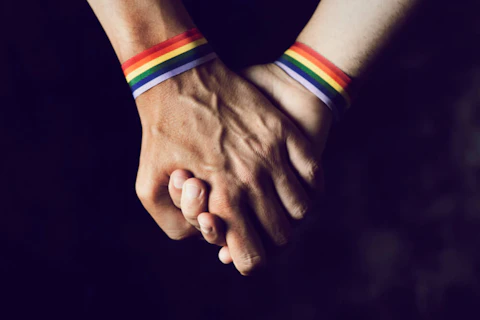Officers have been accused of lobbing homophobic slurs, sexually harassing LGBTQ people, and intentionally misgendering transgender protesters.
Protesters across the country have reported a spate of anti-LGBTQ incidents as police crack down on crowds demanding justice for George Floyd, a black man killed by a white Minneapolis police officer in April.
Chicago police are currently investigating a May 30 incident that was caught on video, in which an officer used a homophobic slur to address protesters.
In the video, originally posted to Facebook, several unidentified individuals yell at the officer, who is seen walking away to his vehicle, as another person out of frame throws a traffic cone in the officer’s direction.
The officer then turns around and walks toward the crowd again. “Yeah, wait until I turn my back, you fucking f—-t,” he yells.
The man who recorded the video, Kyle Cunningham, later told CBS Chicago that the incident “sets us back so many years.”
“It’s really unnerving to know that the people in uniform who are supposed to protect us are actively going against us,” he said.
Chicago Mayor Lori Lightfoot, the first black woman and first openly gay person to be elected mayor in Chicago, said of the incident, “We will not tolerate profanity and homophobic comments that demean the badge, demean the honor of being a Chicago police officer, and demean the value of who we are as Chicagoans.”
According to CBS Chicago, lawsuits against the Chicago Police Department involving misconduct toward LGBTQ people have cost the city nearly $300,000 in settlements.
Similar reports of police harassing gender nonconforming, transgender, and nonbinary protesters have cropped up at other protests recent days.
A protester arrested in Los Angeles, Julia Dupuis, tweeted about their alleged assault by police on June 2, saying that, after they were zip-tied and facing a wall, they heard two male police officers say, “Do you think it’s a female? Are you sure?”
Dupuis said the police officers then laughed as they touched Dupuis’ breasts and the front and back pockets of their pants.
“I was not the only gender non conforming protestor to be called ‘it.’ There were trans/non-binary protestors divided into the ‘male’ and ‘female’ buses and deliberately misgendered,” they wrote.
Dupuis added that they were “not the only protestor to be sexually harassed or made uncomfortable.”
Dupuis said that LAPD Police Chief Michel Moore had reached out to them about an internal investigation and that they were “discussing the possibility” of legal representation.
As the number of people arrested at the nationwide protests rises, so too are incidents of sexual assault and harassment against transgender women.
Joan Fochs, a transgender woman, attended a demonstration in Seattle on the evening of May 31, at which an officer accused her of assaulting him. Fochs said she didn’t touch the officer but was booked on suspicion of assault regardless and taken to the King County Correctional Facility early in the morning, where she was housed with men.
According to Patch.com, Fochs was told she couldn’t be housed separately from men because she hadn’t yet changed her gender marker officially. A man in the cell across from her subsequently harassed her for several hours and allegedly exposed himself to her through a slot where staff deliver food to inmates, she told Patch.
Fochs said she pressed a call button in her cell to get help but officers did not answer it. When she told officers she wanted to file a harassment complaint, they reportedly ignored her and “just [kept] moving along.”
Even after officers finally moved the man who harassed her, Fochs faced repeated harassment from other male inmates before she was released.
In other parts of the country, police have entered LGBTQ establishments uninvited.
Police in Des Moines, Iowa, entered an LGBTQ bar last week, after some staff went outside to aid protesters who had been hit with tear gas. Police showed up moments later, demanding that everyone who had retreated inside the bar leave immediately.
They then entered the establishment, making their way to the basement where they found one individual, who was not a protester, and frisked him.
“I don’t know if they thought that we were hiding anybody, but we weren’t. I don’t see the reason for them to march in here without reason,” bar owner Bryan Smith said.
The ongoing attacks by police against LGBTQ protesters and bystanders are indicative of a larger problem.
According to the 2015 U.S. Transgender Survey, conducted by the National Center for Transgender Equality, 58% of trans people said they had been verbally, physically, or sexually mistreated in some way by law enforcement and more than half of the more than 27,000 respondents said they were uncomfortable going to the police for help.
A 2015 Williams Institute at the UCLA School of Law report also found that LGBTQ people still face discrimination from police officers and that LGBTQ people of color and all members of the transgender community were among the group most targeted by police officers.
Published with permission of The American Independent Foundation.



